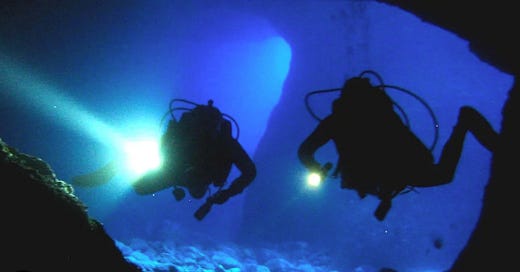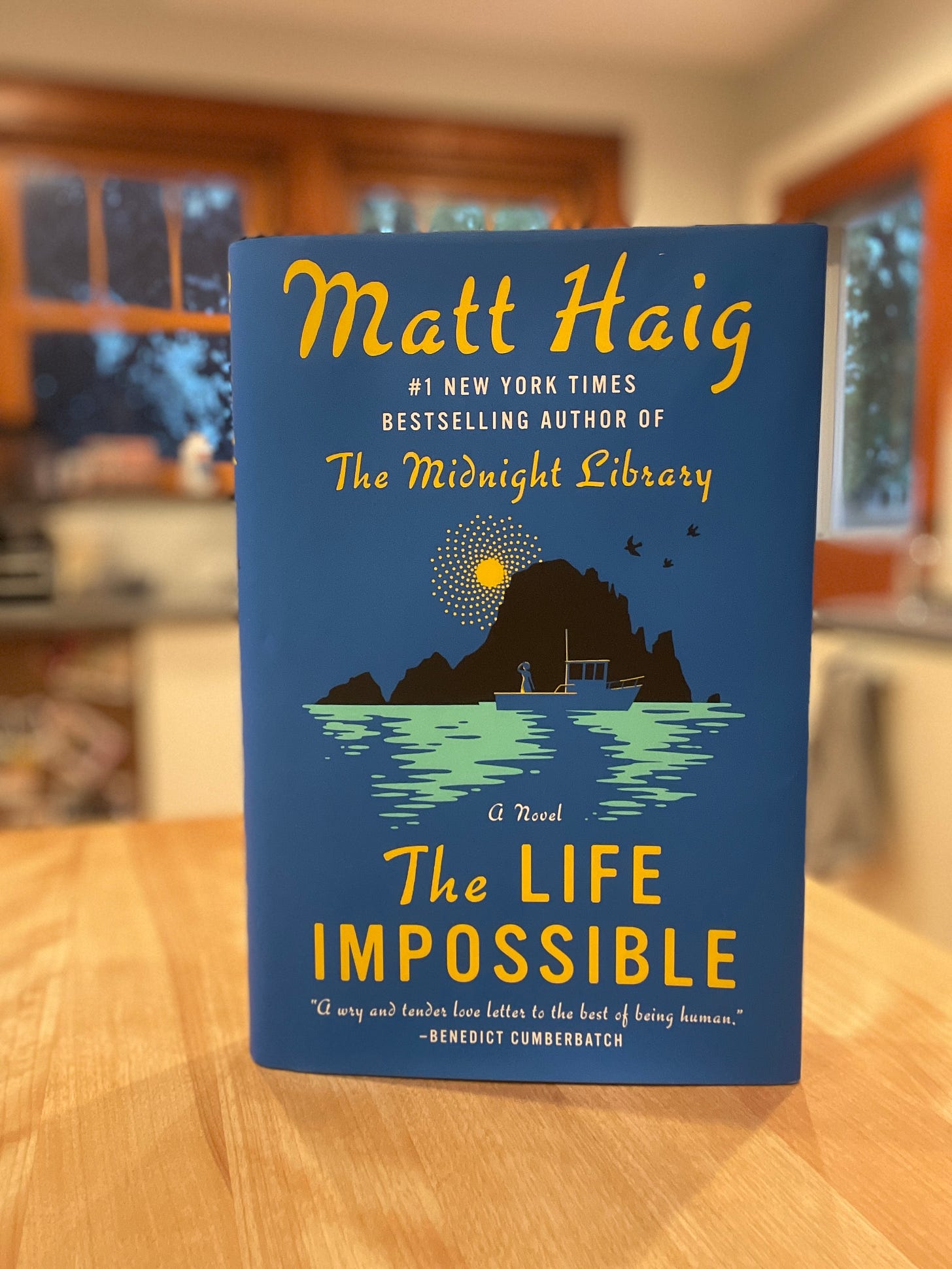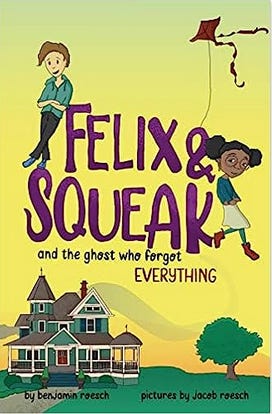SPOILER ALERT…I’ve read through p. 118 in The Life Impossible, and what follows will give away and detail things that happen up to that point.
____________
The Life Impossible begins with a letter. A pair of letters, actually. One written to Grace Winters from Maurice, an old student of hers, and one from Grace back to Maurice. Maurice has written Grace because he has recently bumped into a mutual acquaintance, who mentioned the death of Grace’s husband. Maurice has written to offer his condolences, which he gives, only to then pivot hard into his own confessional, unburdening himself out of the blue to his former teacher.
Maurice tells Grace that he’s not doing well. His mom has died. He doesn’t get along with his father. His sister needs “even more support now.” And, he was recently dumped by his girlfriend. All this loss has Maurice spiraling and on the verge of a breakdown. He says that sometimes, he “can’t breathe with all the pressure.” He then digresses into a long-ish metaphor about his life seeming like a number pattern and bemoans the sorry state of the world. He sees the whole species as being on a “path to destruction” and that “everything feels impossible.”
He ends by saying he doesn’t know why he’s told Grace all this, but that he needed to just tell someone.
Does any of this strike you as strange? It certainly struck me that way. Who writes someone such a brutally honest missive after having not seen them in years? And in such abstract terms? But I was also moved by Maurice’s plea, and as a former teacher myself, I wanted Grace to re-assure Maurice. Which she does. Sort of.
Grace responds, telling Maurice how sorry she is for all he has been through. She says that she doesn’t normally respond to emails, but that she feels compelled to “reply, and reply properly.” She then says that this is actually her second reply to Maurice. That her first attempt “just grew and grew, far beyond a little email.” She says that it is a story “of a person who felt there was no point left in her existence,” only to then find “the greatest purpose she had ever known.” She also hints that her story may defy belief, but that it is all true. And that “sometimes what looks like magic is simply part of life we don’t understand yet.”
Grace says that first email, the story she’s written, is attached. That story, we now sense, is the book we are about to read. So, if we’re taking all this literally, means that Grace got Maurice’s email, then began a response back to him, only to have that response swell into the length of an entire book, which in reality would have taken her at least weeks, if not months, to write.
It strikes me that neither of these two letters—Maurice’s or Grace’s—is actually very likely. Maurice’s letter purports to be one of condolence, but is actually strangely confessional and needy. It feels less like a letter than one side of a therapy session. Grace’s is even less likely, in that it is purporting to be an entire novel that she didn’t really mean to write. She’s also assuming that Maurice, upon receiving a three hundred page response to his one page email, will sit down and read the entire thing.
Let’s pause here to ask a question: Do novels need an occasion to exist? Meaning, do they need a formal purpose to be, or justify their existence? Most novels, of course, do not. They simply are. They are found objects that immerse, entertain, inspire, and distract us. Some novels choose to establish a context for their existence within the lived world of their characters. Someone’s diary was found. An older person is recounting the fantastic events of her youth. We’re reading interviews with former bandmates. A series of letters is exchanged. A death row inmate confesses the night before he’s executed. And so on.
Haig has chosen to give us a capital “R” reason this book exists. It exists because Grace has written it down as a response to Maurice, who she thinks needs to hear it, and that she needs to tell it. All this begs the question: If Maurice hadn’t written first, would this book exist at all?
I might be belaboring the issue here, but my point is that Haig has made a BIG choice, both in setting up an epistolary form for his novel (letters), only to veer away from that form right away.
We do, though, learn some important things about Grace from her response to Maurice:
We learn that she’s an empathetic person. She’s written back to Maurice, after all, and wants to make a positive impact on his life.
We learn that she has been through a lot. Presuming she is the “person” referred to in her email, she’s gone from wondering if there was any point left in being alive to finding “the greatest purpose” she’s ever known.
By the way, it would be fascinating if Grace turns out not to be the person she’s referring to.
We also learn that she’s “dealt with a lot of guilt” in her life, and that “in a way, this story is about that.”
So, from a character angle, the letter is helping establish the kind of person Grace is, or wants to be seen as.
While not all novels need a “reason” to exist, all novels do need an inciting incident to get things moving, and in The Life Impossible, we have two:
The death of Grace’s husband, Karl, a few years earlier.
A letter Grace recently received, informing her she’s been left a property in Ibiza, Spain. Curiously, the person who left her the property is someone she barely knew, a long-ago former colleague named Christina, who was a music teacher at the same school. Christina has died and left her property to Grace for “an act of kindness long ago.”
Like me, you might be thinking: another letter? That’s four so far. Maurice’s to Grace. Grace’s first response, which is this book. And her second response, giving context for the first. Now, our inciting incident in Grace’s actual story is yet another letter, one from Christina to Grace. Or at least from Christina’s lawyer, informing her of this strange inheritance.
There’s also a sort of third inciting incident. Except it happened way before the novel begins. And that was the death of Grace’s only son, Daniel, when he was a boy, a tragic loss which unmoored her, and from which she has never recovered.
Christina leaving Grace her property in Ibiza, coincidentally, finds Grace at a moment in her life in which she is well poised to receive such a strange gift. Grace just happens to be retired, widowed, alone, and sad. You might even say she’s in need of an adventure. Christina though, we can presume, would have no way of knowing any of this. For all she knows, Grace could be dead. Or have moved to a new address. Or have to work the next day so she couldn’t possibly quit her life and move to Ibiza. But let’s set those concerns aside for now and trust our author.
Upon arriving in Ibiza, Grace peruses Christina’s house and eventually finds an actual letter from Christina. We sense this letter is very important to our story, but for some reason, Christina has chosen to hide this letter, assuming Grace will case the place carefully enough to find it. Again, imagine if Grace hadn’t found it? Our story would end rather quickly. Grace might have hung out in Ibiza for a week, then flown home and gone back to being sad and lonely. Anyone else noticing that Haig has hung his narrative on a number of precarious factors and coincidences?
In this letter, Christina gives several reasons why she “chose” Grace:
She believes Grace saved her life years ago by being kind to her.
That she has left Grace her home for a good reason, but one that would sound insane if she tried to explain it. Somehow, she knows Grace is the “right person.” We, of course, wonder, the right person for…what?
That she believes Grace is a “very rare person.”
That she (Christina) knows she is about to die and that’s why she’s taking sudden action to set her affairs in order, by leaving all her worldly possessions to someone she hasn’t seen or talked to in thirty years, and then hiding the letter that explains why.
In her letter, Christina gives Grace a to-do list while in Ibiza, the last of which feels the most important of all. She must go to Atlantis Scuba to see Alberto, and then go see the ocean seagrass meadow, which is the oldest living organism on Earth. She tells Grace that she should keep her mind open while she is there, and that “any change that happens will be for the better.”
Haig’s narrative is many things. It’s quite charming and lovable, but it is not very subtle. In addition to Christina’s letter, pretty much everyone that Grace meets in Ibiza hints that there is weirdness afoot. Strange sights and sounds. A mystical presence around Christina’s house, and in the ocean. An olive jar full of sea water that somehow refills itself all on its own. Even the cab driver who first takes Grace to Christina’s house from the airport speaks of seeing strange things from Christina’s house, including a light so bright he nearly drove off the road.
The book is sort of shouting at us while also beating us mercilessly over the head: THERE IS SOMETHING WEIRD COMING!! AND IT’S PROBABLY MAGICAL!
This is further justified when Grace checks off another item on Christina’s to-do list and visits Sabine at the Las Dalias hippy market, who tells Grace that Christina could literally see the future. And that this ability also caused her to make enemies.
Along the way, Grace is warned several times by the locals to stay the hell away from Alberto at the scuba shop, all but guaranteeing that she will be going to see Alberto quite soon, which she does because she comes to believe he’s the only one who really knows the truth about what happened to Christina. You know what happens next.
Grace goes scuba diving with Alberto in the middle of the night, sees a bright light under the water in the aforementioned seagrass meadow, then wakes up in the hospital a bit later where she can suddenly read people’s minds. Or at least read their memories. That’s where I’ve stopped.
What do you think of this book so far? Are you enjoying it? I am. Quite a bit, in spite of what might feel like my incessant niggling at some occasionally ham-fisted foreshadowing and clunky plotting. It’s easy to turn Haig’s pages, and easy to like his characters. On a sentence level, the book is pleasant to read, and the exotic setting is charming. And as a parent, I’m especially attuned to Grace’s sorrow over the loss of her son, and the guilt she feels that it’s her fault.
And all this magic, or whatever we might call it, basically puts a gun to our heads to ensure we keep reading to find out what it really means, and what actually happened to Christina, and now, to Grace. When it comes to magical realism, I’m here for it.
In short, I’m excited to keep reading.
My biggest bone to pick with The Life Impossible so far is around the elaborate set up that Haig has gone through to get Grace to Ibiza, and all the clues and good luck and coincidences needed for all of this to have happened. For Christina’s communication to first reach Grace. For Grace to be in a position to act. For Grace to find the letter in Christina’s house. For Grace to find Alberto. Then, moving fluidly through time, for Maurice to write to Grace and inspire her to write all this down so we could read it in the first place. Maybe all this set up is actually needed and will justify itself along the way, but here’s what I wonder:
Why not just plop a woman named Grace in Ibiza and proceed from there? Maybe she’s widowed and just wants a change of pace to try and move on with her life. Maybe she is merely on vacation. Maybe her sister moved there and Grace has gone to visit. She encounters strange things, bumps into magic, decides to take up scuba diving, meets Alberto, sees the light, gains telepathy. We could get Grace to largely the same place without Christina, and without Maurice for that matter. Why do we need them in Grace’s story?
Haig is a purposeful writer, so he’s done all this for a reason. Figuring out why Haig has taken the time to set the book up this way is one of my biggest questions as I continue reading. I sense it will have something to do about the impact we have on each other’s lives and the vital importance of small acts of kindness and forgiveness.
I think I’ll stop there and continue reading. If you’re reading along, let me know how it’s going in the comments. I’d love to know what you think!
But, if possible, try to limit your comments to what happens in the book only up to p. 118.
See you on the other side.
____________________
New to my work? I write books for young readers and the young at heart. Click one of the covers below to get acquainted.













